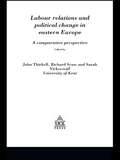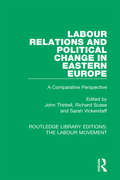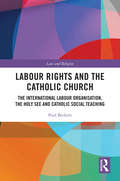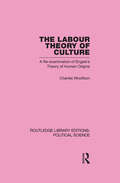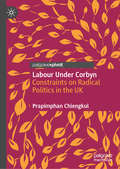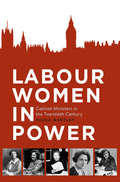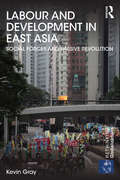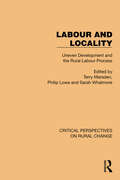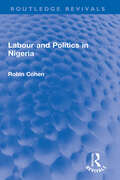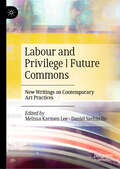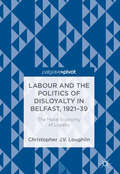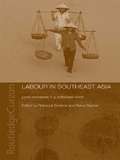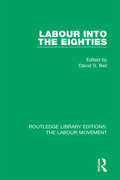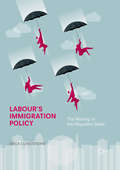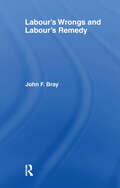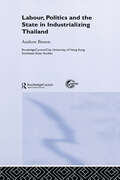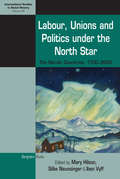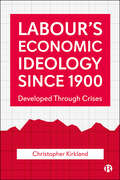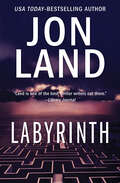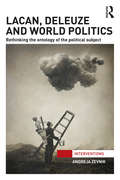- Table View
- List View
Labour Relations In Eastern Europe: A Comparative Perspective (Routledge Library Editions: The Labour Movement Ser. #39)
by Sarah Vickerstaff Richard Scase John ThirkellThis book offers an insight into the process of transition in Eastern Europe. It provides a comparative analysis of trends in labour relations with and between countries, incorporating country studies which share a common theoretical and empirical framework. The book is intended for postgraduate and professional researchers and for library markets in the fields of industrial relations, sociology of industry/organizations/work, social structure, and politics. Its comparative framework also makes it useful for European studies.
Labour Relations and Political Change in Eastern Europe: A Comparative Perspective (Routledge Library Editions: The Labour Movement #39)
by Stephen G. JonesFirst published in 1995. This volume offers a comparative perspective on labour relations and political change in eastern Europe within a common theoretical and empirical framework. Its coverage includes Bulgaria, and Czech and Slovak republics, Hungary, Poland, and Russia. Particular attention is given to the dynamics of changes in labour relations and privatisation, which are now critical to the more general process of political and economic transformation. This title will be of interest to scholars and students of politics, sociology and modern history.
Labour Rights and the Catholic Church: The International Labour Organisation, the Holy See and Catholic Social Teaching (Law and Religion)
by Paul BeckettThis book explores the extent of parallelism and cross-influence between Catholic Social Teaching and the work of the world’s oldest human rights institution, the International Labour Organisation (ILO). Sometimes there is a mutual attraction between seeming opposites who in fact share a common goal. This book is about just such an attraction between a secular organisation born of the political desire for peace and justice, and a metaphysical institution much older founded to bring peace and justice on earth. It examines the principles evident in the teachings of the Catholic Church and in the secular philosophy of the ILO; together with the theological basis of the relevant provisions of Catholic Social Teaching and of the socio-political origins and basis of the ILO. The spectrum of labour rights covered in the book extends from the right to press for rights, i.e., collective bargaining, to rights themselves – conditions in work – and on to post-employment rights in the form of social security and pensions. The extent of the parallelism and cross-influence is reviewed from the issue of the Papal Encyclical of Pope Leo XIII Rerum Novarum (1891) and from the founding of the ILO in 1919. This book is intended to appeal to lay, professional and academic alike, and will be of interest to researchers and academics working in the areas of international human rights, theology, comparative philosophy, history and social and political studies. On 4 January 2021 it was granted an Imprimatur by the Roman Catholic Archbishop of Liverpool, Malcolm P. McMahon O.P., meaning that the Catholic Church is satisfied that the book is free of doctrinal or moral error.
Labour Theory of Culture: A Re-examination Of Engels' Theory Of Human Origins (Routledge Library Editions: Political Science #42)
by Charles WoolfsonDespite its importance in understanding the social relations of labour little attention has been paid by Western Marxists to evolutionary theory. Taking as a starting point an unfinished essay by Engels, the author argues that the human species must be seen as discontinuous with its nearest biological ancestors – that a qualitative distinction was brought about by social labour. It is argued that the most likely forms of human organization were co-operative and field studies are discussed which apparently provide evidence for tool use and linguistic ability among the higher primates. The relationship between hand and brain in terms of Marxist psychology is also elaborated.
Labour Under Corbyn: Constraints on Radical Politics in the UK
by Prapimphan ChiengkulThis book provides an accessible yet critical analysis of the Labour Party under the leadership of Jeremy Corbyn (2015-2020) in the context of the contemporary British political economy. It analyses structural constraints on left-wing politics and evaluates the transformative potential of Labour’s economic and social policies under Corbyn. Drawing from a neo-Marxist and neo-Gramscian framework, the book argues that the material, institutional and ideological conditions before 2015 opened political space for a left-wing Labour Party, although the dominant historical structures severely limited its chance of coming to power. In addition, the book argues that Labour under Corbyn should not be dismissed as ‘populist’, and that its policies aimed to redress structural economic problems, promote economic democracy and tackle contemporary challenges. The book also highlights the importance of adopting a long-term approach to counter-hegemonic political struggle so as not to shrink the space for progressive politics.
Labour Women in Power: Cabinet Ministers in the Twentieth Century
by Paula BartleyThis book examines the political lives and contributions of Margaret Bondfield, Ellen Wilkinson, Barbara Castle, Judith Hart and Shirley Williams, the only five women to achieve Cabinet rank in a Labour Government from the party’s creation until Blair became Prime Minister. Paula Bartley brings together newly discovered archival material and published work to provide a survey of these women, all of whom managed to make a mark out of all proportion to their numbers. Charting their ideas, characters, and formative influences, Bartley provides an account of their rise to power, analysing their contribution to policy making, and assessing their significance and reputation. She shows that these women were not a homogeneous group, but came from diverse family backgrounds, entered politics in their own discrete way, and rose to power at different times. Some were more successful than others, but despite their diversity these women shared one thing in common: they all functioned in a male world.
Labour and Development in East Asia: Social Forces and Passive Revolution (Rethinking Globalizations)
by Kevin GrayThe Chinese Communist Party’s response to the wave of factory strikes in the early summer of 2010 has raised important questions about the role that labour plays in the transformation of world orders. In contrast to previous policies of repression towards labour unrest, these recent disputes centring round wages and working conditions have been met with a more permissive response on the part of the state, as the CCP ostensibly seeks to facilitate a transition away from a model of political economy based on ‘low-road’ labour relations and export dependence. Labour and Development in East Asia shows that such inter-linkages between labour, geopolitical transformations, and states’ developmental strategies have been much more central to East Asia’s development than has commonly been recognised. By adopting an explanatory framework of the labour-geopolitics-development nexus, the book theorises and provides an historical analysis of the formation and transformation of the East Asian regional political economy from the end of the Second World War to the present, with particular reference to Japan, South Korea, Taiwan and China. This book will be required reading for students and scholars of international relations, development studies and comparative politics.
Labour and Locality: Uneven Development and the Rural Labour Process (Critical Perspectives on Rural Change #4)
by Sarah Whatmore Philip Lowe Terry MarsdenOriginally published in 1992, the volume shows through the lens of labour processes how global forces are played out at the local level. A range of important issues is addressed, including the commoditization and transformation of rural labour, and the role played by state policy in restructuring rural labour markets.
Labour and Politics in Nigeria (Routledge Revivals)
by Robin CohenOriginally published in 1974 and with a new introduction for the 1981 edition, this book is a clear and vivid history of the role of organized labour in the politics of Nigeria. It covers the period from the first General Strike of 1945 to the civil war and reintegration of the country. As well as providing an analysis of the characteristics and attitudes of Nigeria’s wage earners, this study is concerned with their place in the wider political and social life of the country. The attempts of the trade unions to create a representative central labour organisation are considered, as is the internal structure of the unions themselves. The book also examines the relationship of the Unions with the political parties of the first Republic and later with the Military Government. The influence of the trade unions in the determination of wage rates is analysed. The book concludes with an overview of trade unions in other parts of Africa with which the performance and characteristics of organized labour in Nigeria are compared
Labour and Privilege | Future Commons: New Writings on Contemporary Art Practices
by Melissa Karmen Lee Daniel Szehin HoThis book project was part of an annual series of Summer seminars held at Hong Kong's Tai Kwun Centre for Heritage and Arts, which brought the intellectual community together to debate the social issues of the day. The artists, writers, and scholars included in these texts represent unconventional thinkers completing rigorous scholarship that we think is important to be published today, as Hong Kong seeks for social and political alternatives. This book will be of interest to public intellectuals, political/cultural theorists and thinkers, as well as the international art community.
Labour and the Decolonization Struggle in Trinidad and Tobago
by Jerome TeelucksinghThis book provides evidence that Labour in Trinidad and Tobago played a vital role in undermining British colonialism and advocating for federation and self-government. Furthermore, there is emphasis on the pioneering efforts of the Labour movement in party politics, social justice, and working class solidarity.
Labour and the Politics of Disloyalty in Belfast, 1921-39: The Moral Economy of Loyalty
by Christopher J. V. LoughlinThis book provides the first ‘history from below’ of the inter-war Belfast labour movement. It is a social history of the politics of Belfast labour and applies methodology from history, sociology and political science. Christopher J. V. Loughlin questions previous narratives that asserted the centrality of religion and sectarian conflict in the establishment of Northern Ireland. Labour and the Politics of Disloyalty in Belfast, 1921-39 suggests that political division and violence were key to the foundation and maintenance of the democratic ancien régime in Northern Ireland. It examines the relationship between Belfast Labour, sectarianism, electoral politics, security and industrial relations policy, and women’s politics in the city.
Labour in American Politics (Routledge Library Editions: Political Science #3)
by Vivian ValeThe author analyzes the considerable legislation enacted between 1945 and 1970 and its effect on labour-management-public relations. He looks at their relevance for Britain today, and offers the most complete survey yet available of the operations of American labour as a pressure group.
Labour in Southeast Asia: Local Processes in a Globalised World (Changing Labour Relations in Asia)
by Rebecca Elmhirst Ratna SaptariIn seeking to provoke debate, the book reveals the variety of experiences evident in countries and regions marked by capitalist and (post) socialist regulatory frameworks, and contrasting labour regimes, histories and cultures. The contributions show the importance of critically examining both the complex nature of global-local links and the particular ways economic processes are around the themes of labour regimes, labour processes, labour mobility and labour communities, the essays show how economic development is not only shaped by market forces but is also interlocked in systems of meaning.
Labour into the Eighties (Routledge Library Editions: The Labour Movement #3)
by David S. BellFirst published in 1980. This book covers areas of policy interest viewed from a social democratic perspective and each chapter takes a specific issue which would have been of concern to Labour in the 1980s, including some of the more controversial areas. The study reviews various problem areas and suggests policies which are realistic and applicable in the conditions of the 1980s. This title will be of interests to scholars and students of history and politics.
Labour's Antisemitism Crisis: What the Left Got Wrong and How to Learn From It
by David RentonBetween 2015 and 2020 the Labour Party was riven by allegations that the party had tolerated antisemitism.For the Labour right, and some in the media, the fact that such allegations could be made was proof of a moral collapse under Jeremy Corbyn’s leadership. Sections of the left, meanwhile, sought to resist the accusations by claiming that the numbers of people accused of racism were few, that the allegations were an orchestrated attack, and that those found guilty were excluded from the party. This important book by one of Britain’s leading historians of anti- fascism gives a more detailed account than any yet published of what went wrong in Labour. Renton rejects those on the right who sought to exploit the issue for factional advantage. He also criticises those of his comrades on the left who were ignorant about what most British Jews think and demonstrated a willingness to antagonise them.This book will appeal to anyone who cares about antisemitism or left- wing politics.
Labour's Immigration Policy
by Erica ConsterdineThis book explains how and why the New Labour governments transformed Britain's immigration system from a highly restrictive regime to one of the most expansive in Europe, otherwise known as the Managed Migration policy. It offers the first in-depth and candid account of this period of dramatic political development from the actors who made policy during 'the making of the migrant state. ' Drawing on document analysis and over 50 elite interviews, the book sets out to explain how and why this radical policy change transpired, by examining how organized interests, political parties and institutions shaped and changed policy. This book offers valuable insights to anyone who wants to understand why immigration is dominating the political debate, and will be essential reading for those wanting to know why governments pursue expansive immigration regimes.
Labour's Wrongs and Labour's Remedy: Or, The Age Of Might And The Age Of Right (Reprints Of Economic Classics Ser.)
by John F. BrayFirst Published in 1969. Routledge is an imprint of Taylor & Francis, an informa company.
Labour, Politics and the State in Industrialising Thailand (Routledge/City University of Hong Kong Southeast Asia Series)
by Andrew BrownIn this book Brown argues that workers in East and Southeast Asia are significant actors in political change. Critically examining the themes of labour weakness, political exclusion and insignificance of 'class factors' he aims to bring workers back from the margins, demonstrating that both in the present and past the state has been entangled in processes that determine the forms of their struggles. This book presents new empirical data, important historical material and an innovative approach to workers and politics.
Labour, Unions and Politics under the North Star: The Nordic Countries, 1700-2000 (International Studies in Social History #28)
by Mary Hilson Silke Neunsinger Iben VyffDenmark, Finland, Iceland, Norway, and Sweden today all enjoy a reputation for strong labour movements, which in turn are widely seen as part of a distinctive regional approach to politics, collective bargaining and welfare. But as this volume demonstrates, narratives of the so-called “Nordic model” can obscure the fact that experiences of work and the fortunes of organized labour have varied widely throughout the region and across different historical periods. Together, the essays collected here represent an ambitious intervention in labour historiography and European history, exploring themes such as work, unions, politics and migration from the early modern period to the twenty-first century.
Labour’s Economic Ideology Since 1900: Developed Through Crises
by Christopher KirklandThis book traces the economic ideology of the UK Labour Party from its origins to the current day. Through its analysis, the book emphasises key crises, including the 1926 General Strike, the 1931 Great Depression, the 1979 Winter of Discontent and the 2007/2008 economic crisis. In analysing this history, the ideology of the Labour Party is examined through four core themes: • the party’s definition of socialism; • the role of the state in economic decision making; • the party’s understanding of inequalities; and • its relationship with the trade union movement. The result is a systematic exploration of the drivers and key ideas behind the Labour Party’s economic ideology. In demonstrating how crises have affected the party’s economic policy, the book presents a historical analysis of the party’s evolution since its formation and offers insights into how future changes may occur.
Labyrinth
by Jon LandHunting an old friend&’s killers, a professor-turned-spook unearths a conspiracy that threatens every person on Earth An American op is murdered somewhere in the dusty wastelands of southern Colombia. His final transmission: a desperate warning that whatever he had stumbled upon is worth taking seriously. It is called Tantalus, and in two weeks it will be unleashed on the world. Washington could dispatch the army, the commandos, or the CIA, but professional action will only send the men behind Tantalus under deeper cover. Instead, the State Department chooses Christopher Locke, an old friend of the deceased. Once the Academy&’s strongest agent, he&’s an unemployed professor with crushing bills, three children, and no prospects. These are problems the government can solve. All he has to do is get on a plane—and take his vengeance. This ebook features an illustrated biography of Jon Land including rare photos from the author&’s personal collection.
Labyrinth: An Essay on the Political Psychology of Change
by R.E. WilsonTo receive tenure, college and university professors have long been required to write scholarly monographs or articles, engage in serious research and teach effectively. This collection of articles marks the first effort to evaluate the place of digital scholarship in this process.
Labyrinth: The Pursuit of the Letelier Assassins
by Taylor Branch Eugene M. PropperInvestigation and prosecution of a car bombing which killed, among others, a Chilean Ambassador.
Lacan, Deleuze and World Politics: Rethinking the Ontology of the Political Subject (Interventions)
by Andreja ZevnikThis book aims to re-think the way in which the subject is inscribed in the modern political, and does so by exploring the potentiality of Lacano-Deleuzian theoretical framework. It concerns a different ontology and a non-dualist understanding of political and legal existence, by focusing on questions such as how to think alternative notions of political existence and what kind of political, social and legal order do these come to create. This investigation into political appearance of subjects through concepts of law, body and life is led and influenced by the thought of Gilles Deleuze and Jacques Lacan, as well as Alain Badiou, Antonio Negri and Slavoj Žižek. The book takes on various conceptualisations of life, explores the relationship between law and life and develops an alternative notion of legal and political existence in particular in the context of rights. On the back of Guantánamo’s legal and political discourses this work aims to show why and how the problems of world politics or the limitations of (human) rights discourse require an engagement with questions such as what it means to exist as a human being, what forms of life are politically recognised, which are not, and why this distinction. By pointing to a different ontology for thinking and understanding global politics and demonstrating how a trans-disciplinary and philosophical approaches can foster the debates in world politics, this book will be of interest to postgraduates and scholars working on critical normative ideas in international politics, critical security studies and critical legal studies.
